|
|
|
Sort Order |
|
|
|
Items / Page
|
|
|
|
|
|
|
| Srl | Item |
| 1 |
ID:
193190


|
|
|
|
|
| Summary/Abstract |
Decentralized court finance and personnel management practices have been criticized for breeding extra-judicial interventions and corruption in China. Determined to advance law-based governance and to constrain recalcitrant local leaders, the Chinese leadership under Xi Jinping in 2014 rolled out reforms to centralize local court finance to the provincial level with the aim to sever local courts from local influence. Despite high expectations, implementation is at best partial. Close to half of all provinces have not accomplished the required changes, and more than half of all court expenditure continues, to date, to remain reliant upon local governments. The direct reason is that provincial governments lack sufficient and sustainable fiscal capacity to finance the operation of local courts without central assistance. Different interests between major stakeholders, namely the courts and the fiscal bureaus, also add to coordination problems and difficulties in reform implementation, in particular the tension between fiscal adequacy pursued by the judiciary and fiscal management efficiency stressed by finance bureaus.
|
|
|
|
|
|
|
|
|
|
|
|
|
|
|
|
| 2 |
ID:
179292


|
|
|
|
|
| Summary/Abstract |
The local party-state has always been a major source of extrajudicial influence in China. Drawing on interviews with judges, this article examines the impact of Xi Jinping's ambitious judicial centralization reforms, which are aimed at enhancing judicial autonomy by transferring authority over local court personnel and finances from local to provincial level. It finds that the reforms have achieved limited results. Although many appointment and budgetary powers were formally transferred to the provincial level, the local party-state retains considerable influence in both areas owing to its superior manpower, local knowledge and, in the case of developed regions, financial resources. Moreover, the local party-state maintains significant informal influence over the courts, which require many forms of discretionary assistance from various state organs – ranging from appropriating land for new courthouses to providing police protection for remote tribunals – in order to function. This setback highlights the depth and complexity of the courts’ political and economic embeddedness and serves as a reminder of the inherent difficulty of institutionalizing judicial autonomy, however limited, in a large and diverse party-state.
|
|
|
|
|
|
|
|
|
|
|
|
|
|
|
|
| 3 |
ID:
109944


|
|
|
|
|
| Publication |
2012.
|
| Summary/Abstract |
Militaries throughout the world operate their own courts to prosecute military crimes, such as insubordination, that are not part of civilian legal codes. Latin American militaries traditionally have extended this hermetic justice system to cover all crimes committed by their personnel, allowing the institution to sit in judgment of its own actions and escape punishment for human rights violations. This parallel legal system erodes the principle of equality before the law, threatens civilian control of the military, and nurtures a culture of impunity. This article develops a theoretical model to explain the state of military court jurisdiction over military personnel for human rights violations in democracies. It then empirically tests this model on seventeen cases in Latin America. The article concludes that the variation in reform of military courts is a result of the relative balance between the extent of military autonomy and the strength of the civilian reform movement.
|
|
|
|
|
|
|
|
|
|
|
|
|
|
|
|
| 4 |
ID:
075021


|
|
|
|
|
| Publication |
2006.
|
| Summary/Abstract |
This article is explores UNDP's SSR activities in Mozambique, from the last stages of the post-civil war DDR programme until the beginning of 2005. It focuses primarily on the police force while looking at similar efforts in the judicial sector. It also focuses on how UNDP's strategic planning capacity and programme approaches affected the outcome of reforms sought. Finally, it analyses the constraints of Mozambique's SSR that affected its progress and implementation, including the rationale for embarking on reform and the persistent resistance to change by national institutions.
|
|
|
|
|
|
|
|
|
|
|
|
|
|
|
|
| 5 |
ID:
106079
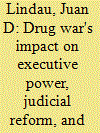

|
|
|
| 6 |
ID:
091106
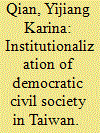

|
|
|
|
|
| Publication |
2009.
|
| Summary/Abstract |
A young democracy, Taiwan lacks agencies of horizontal accountability and aspects of a thick rule of law. This paper examines how an institutionalized, democratic civil society has held the antiquated judiciary vertically accountable for violations of due process in the famous Hsi-Chih Trio death penalty case.
|
|
|
|
|
|
|
|
|
|
|
|
|
|
|
|
| 7 |
ID:
186946
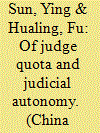

|
|
|
|
|
| Summary/Abstract |
This article presents the findings of original research on “judge quota” reform. The reform's agenda was essentially aimed at professionalization: by edging out a given percentage of judges, only the better qualified judges would be re-appointed to create a more professionalized judiciary. A key component of the reform was to reduce the level and the intensity of both political and bureaucratic control over judges in adjudication and to decentralize judicial power to the rank-and-file judges, restoring individualized judging while enhancing judicial accountability. This article critically examines the potential and limits of the judge quota reform in the context of incremental legal reform in a party-state.
|
|
|
|
|
|
|
|
|
|
|
|
|
|
|
|
| 8 |
ID:
115494
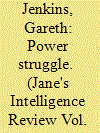

|
|
|
| 9 |
ID:
051284
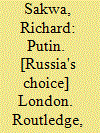

|
|
|
|
|
| Publication |
London, Routledge, 2004.
|
| Description |
xi, 307p.hbk
|
| Standard Number |
0415296633
|
|
|
|
|
|
|
|
|
|
|
|
Copies: C:1/I:0,R:0,Q:0
Circulation
| Accession# | Call# | Current Location | Status | Policy | Location |
| 048032 | 947.086092/SAK 048032 | Main | On Shelf | General | |
|
|
|
|
| 10 |
ID:
112439
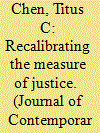

|
|
|
|
|
| Publication |
2012.
|
| Summary/Abstract |
This article seeks to explain contradictions that have abounded in China's judicial reform, i.e. the juxtaposition of liberal and authoritarian characteristics. Incompatible phenomena came about because the post-1999 judicial reform has failed to rein in local and departmental resistance in key issue areas. China's national principals accepted the judicial system's policy prescription of administering the country by law, with an aim to reclaim central control over local state agents. However, the national leadership's varying political support to different aspects of judicial reform resulted in uneven outcomes and frustrated the goal of judicial centralization. In order to secure the goal, the national leadership has, since 2006, reinstituted more authoritarian policy imperatives into the existing liberal framework of judicial reform. China's post-1999 judicial reform has therefore oscillated between merit-based professionalism and allegiance-oriented demand. Conceptual incompatibility eventually led to behavioral contradictions and delivered mixed signals.
|
|
|
|
|
|
|
|
|
|
|
|
|
|
|
|
| 11 |
ID:
131952
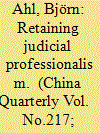

|
|
|
|
|
| Publication |
2014.
|
| Summary/Abstract |
In 2011 and 2012, the Supreme People's Court (SPC) published its first "guiding cases." Guiding cases serve as decision-making models that must be taken into account by lower courts when deciding similar cases. This study argues that the establishment of a national formal legal mechanism to improve consistency in adjudication across jurisdictions and geographical boundaries will strengthen judicial professionalism. The guiding cases system provides the SPC with an instrument to steer adjudication in lower courts discreetly, thereby allowing it to exercise significant influence over legal developments. Given the complexity of cases, compared to law set out in statute, non-lawyers may have tremendous difficulty in understanding and assessing the effects of guiding cases; this in turn acts as a protective mechanism against extra-legal interference. The reform is an example of the SPC's delicate manoeuvring in order to retain judicial professionalism in a hostile yet politically conservative environment. It reflects an attempt by the SPC to strengthen its position vis-à-vis other actors of the party-state and to consolidate the judiciary's function as an adjudicative institution that works on the basis of formal legal mechanisms.
|
|
|
|
|
|
|
|
|
|
|
|
|
|
|
|
| 12 |
ID:
158260
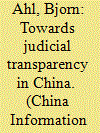

|
|
|
|
|
| Summary/Abstract |
Since 2013 judicial reforms in China have intensified. While recent studies of the Chinese judiciary have focused on structural reforms concerning the jurisdiction of courts and internal court management, it has largely gone unnoticed that the Supreme People’s Court (SPC) has established an open-access database archiving the decisions of every court in China. On the basis of legal documents, secondary literature and interviews with experts, this study investigates the implications of the new database. We find that the database establishes new channels of communication that affect the relationship between the courts and the public, and the position of judges within the judiciary. Further, the open-access database facilitates changes in the structure of communication among legal experts, which in turn promotes legal professionalism. We argue that the SPC made use of the party policy on the direct accountability of the courts towards the people in order to pursue its institutional interest in a professional judiciary.
|
|
|
|
|
|
|
|
|
|
|
|
|
|
|
|
|
|
|
|
|